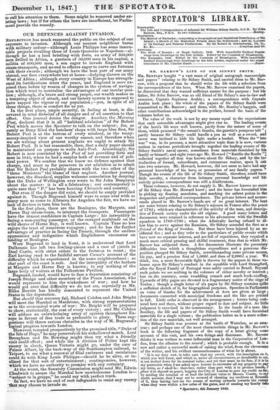OUR DEFENCES AGAINST INVASION.
REFLECTION has much reassured the public on the subject of our exposure to invasion. Although our nearest neighbour burns with military ardour—although Louis Philippe has some inscru- table projects rivalling those of Louis Quatorze or Napoleon—al- though he has a land bristling with forts, an army of 350,000 men drilled in Africa, a garrison of 50,000 men in his capital, a militia of 800,000 men, a son eager to invade England with steam-transports, and no end to officers eager to carve out fortunes with their swords ; although we have the best part of our army abroad, our fleet everywhere but at home—dodging slavers on the West of Africa ; although every country in Europe has strength- ened its fortifications since the peace, and England is more ex- posed than before by reason of changes in the system of naviga- tion which tend to neutralize the advantages of our insular posi- tionalthough, if a brave and strong people, our wealth makes us a tempting object of attack, and our factory system is supposed to have sapped the vigour of our population ;—yes, in spite of all these things, there is comfort for us yet.
In the first place, ample security, in feeling at least, is dis- covered in utter disbelief of all danger and of all assertion to that effect. One journal denies the danger. Another, the Morning Post, declares that it is all "habitual adulation" of Sir Robert Peel which moves the Spectator to talk on the subject ; for, as surely as Bony filled the butchers' shops with large blue flies, Sir Robert Peel is at the bottom of every misdeed, in the toozy- moozy-inspired view of our worthy censor, and therefore when we are writing about present neglects we ought to attack Sir Robert Peel. It is but reasonable, then, that a daily paper should be maintained on purpose to write Anti-Peel. Accordingly, Sir Robert is now convicted by the Post of not providing forts and men in 1845, when he had a surplus both of revenue and of poli- tical power. We confess that we know no defence against that charge, and must so far persevere in our adulation as to admit that Sir Robert Peel probably shares with the two other of the " three Ministers" the blame of that neglect. Anotherjournal, however, the Standard, supplies welcome consolation by denying that the Duke of Wellington ever wrote to Sir John Burgoyne about the matter: it is all a fabrication ; our contemporary is quite sure that "P." has been hoaxing Chronicle and country. But even if the danger did exist, we should be amply provided against it. Though Bugeaud himself were to come over with as many men as came to Albracca for Angelica the fair, we have no lack of devices to turn him back.
In the first place, there are the Boulogne, the Margate, and Herne Bay steam-boats, to intercept the transports. Passengers have the utmost confidence in Captain Large : his intrepidity in facing a non-paying passenger, or the enraged multitude on the wild shores of Herne Bay, is well known. Captain Tune no less enjoys the trust of numerous voyagers ; and he has the further advantage of practice in facing the French, through the endless oppressions and indignities which Englishmen encounter on landing at Boulogne.
Were Bugeand to land in Kent, it is understood that Lord Dalhousie has left two fowling-pieces and a case of pistols in Deal Castle, with strict orders to the footman to resist ; the Earl having read to the faithful servant Ctesar's account of the difficulty which he experienced in the same neighbourhood : so that part of the coast is safe. And the intrepidity of the bathers at Margate and Herne Bay is known ; to say nothing of the large body of waiters at the Folkestone Pavilion.
Bugeaud, landed, would have to face a deputation consisting of Joseph Sturge and other members of the Peace Association, who would represent to him the wickedness of war ; and how he would get over that difficulty we do not see, especially as Mr. Elihu Burritt has kindly consented to represent the United States in the deputation. But should that resource fail, Richard Cobden and John Bright will meet the Marshal at Maidstone, with strong representations as to the economical waste of war : Mr. Bright will be prepared to show, statistically, the cost of every victory ; and Mr. Cobden will adduce an overwhelming array of opinion throughout Eu- rope in favour of free trade as preferable to glory. These sug- gestions will throw serious obstacles in the way of M. Bugeaud's logical progress towards London. However, tempted prospectively by the promised title, "Duke of the Isle of Dogs," he may persevere in his unhallowed march. Lord Brougham and Dr. Bowring might then try what a friendly visit could effect ; and while the A division of Police kept the enemy in check, Queen Victoria might go, under the care of Prince Albert, by the back-way of the Southampton railroad, to Treport, to see what a renewal of filial embraces and osculations could do with King Louis Philippe—should he be alive, or in- clined for that sort of entertainment ; contingencies, however, which we have no authority to promise with any certainty.
At the worst, the Sanatory Commission might send Mr. Edwin Chadwick to assure the Marshal how unwholesome London is— "subject to la grippe," he could say with perfect truth. In fact, we have no end of such safeguards to resist any enemy -ihat may choose to invade us.


























 Previous page
Previous page